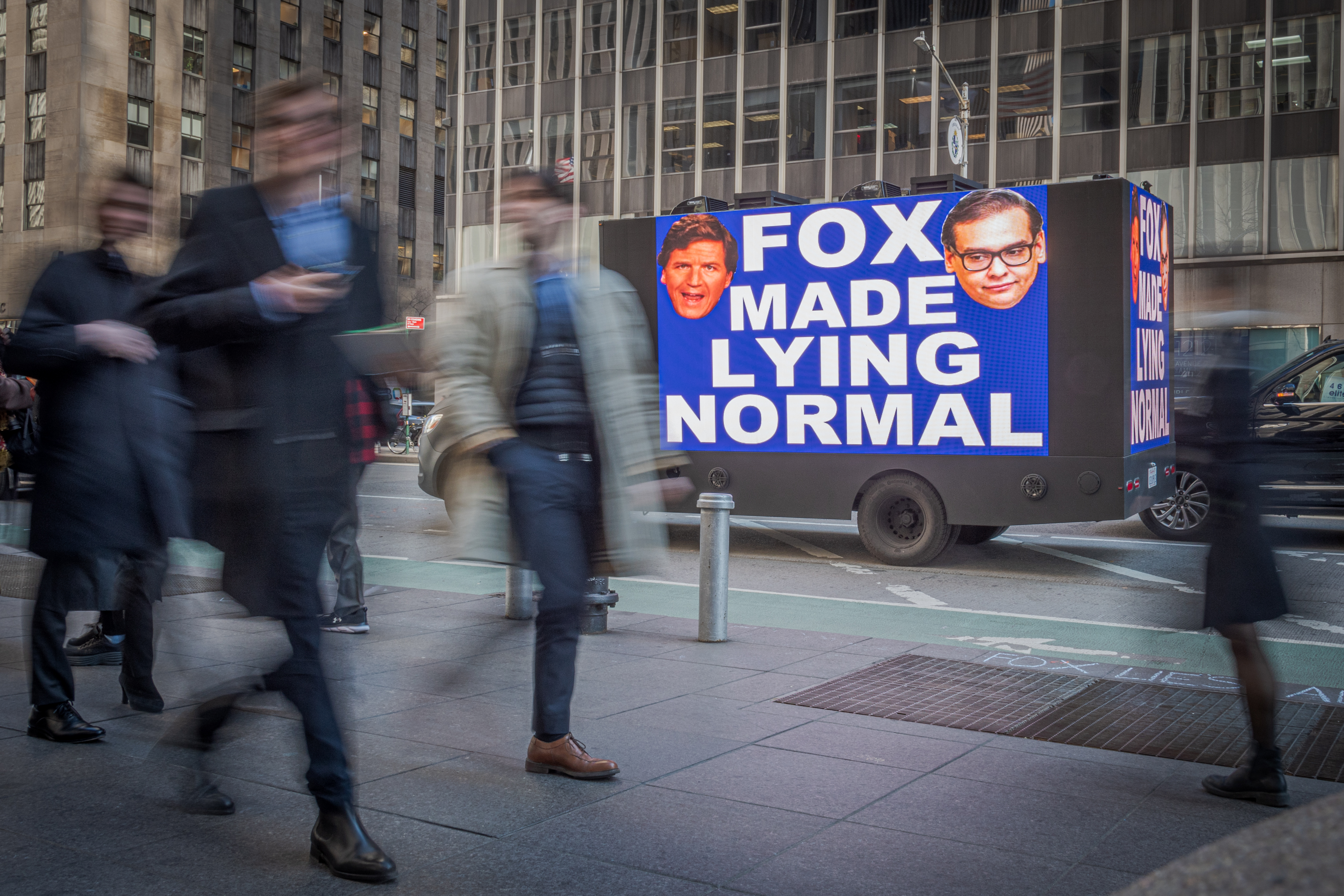Making sense of the Fox News-Dominion settlement
Why Dominion took the money, and what it means for Rupert Murdoch, journalism, and the U.S. body politic


A free daily email with the biggest news stories of the day – and the best features from TheWeek.com
You are now subscribed
Your newsletter sign-up was successful
Dominion Voting Systems' eagerly anticipated $1.6 billion defamation trial against Fox News ended Tuesday with a settlement. Right before lawyers for Fox and Dominion were scheduled to make opening statements to the already seated jury, Delaware Superior Court Judge Eric Davis announced that the parties had settled the case, the jury had been dismissed, and the trial was over before it began.
Dominion lawyer Justin Nelson announced shortly afterward that Fox had agreed to pay $787.5 million to avoid a trial. "The truth matters. Lies have consequences," he said. "Money is accountability," said Stephen Shackelford, a second Dominion lawyer, "and we got that today from Fox." The full terms of the settlement haven't been — and may never be — disclosed, but Fox News will evidently not have to read an apology or admission of wrongdoing on air.
Fox News released its own short statement, acknowledging "the court's rulings finding certain claims about Dominion to be false," and adding: "This settlement reflects Fox's continued commitment to the highest journalistic standards." CNN's Jake Tapper had trouble reading the statement with a straight face.
The Week
Escape your echo chamber. Get the facts behind the news, plus analysis from multiple perspectives.

Sign up for The Week's Free Newsletters
From our morning news briefing to a weekly Good News Newsletter, get the best of The Week delivered directly to your inbox.
From our morning news briefing to a weekly Good News Newsletter, get the best of The Week delivered directly to your inbox.

Here's a look at what the settlement means for the conservative news powerhouse, the U.S. body politic, and accountability for the post-election lies of 2020.
Fox News dodged a bullet
For its payout, "Fox News has avoided an excruciating, drawn-out trial" that would have forced some of its biggest stars and its chief, Rupert Murdoch, to grapple with the "embarrassing question" of why they perpetuated a "virulent and defamatory conspiracy theory" about the 2020 election that they knew wasn't true, The New York Times notes in an analysis.
"If it seems fairly daft to congratulate Rupert Murdoch" for spending $787.5 million to avoid a trial, you need to understand that "in the Murdoch universe, paying such settlements is just the cost of doing business Murdoch-style," Jack Shafer writes at Politico. If the case had gone to trial, "a stream of ugly would have been on the Fox image, day after day." Avoiding that outcome for $787.5 million is "a kind of bargain" considering the company's $17.3 billion market cap.
Will the settlement "tame" the network? "Don't kid yourself," Shafer says. Because it doesn't have to apologize on-air, "Fox will continue to air its swill" for its loyal, "gullible viewership," and "Rupert Murdoch, the indestructible Rupert Murdoch, will carry on as he always has. He will have won once again."
A free daily email with the biggest news stories of the day – and the best features from TheWeek.com
Murdoch sustained a 'significant blow'
Settling is "the name of the game for Fox and its owners in such situations," Aaron Blake writes at The Washington Post, citing the British phone-hacking scandal, sexual misconduct accusations, and gender discrimination cases of years past. But in the Dominion case, the damage was done. Revelations had shown that Fox News anchors, hosts, and executives knowingly broadcast lies for business reasons. In that sense, "Dominion, while having understandable motives to settle, struck perhaps the most significant blow to date against Fox well before it agreed to the deal," Blake adds.
It is not surprising that Fox News settled before trial, Michelle Goldberg writes at The New York Times. "Fox News, after all, had no viable defense." And that may prove costly, again, when a second voting tech company, Smartmatic, begins its $2.7 billion defamation suit against Fox. Maybe Smartmatic will manage to force Murdoch and Fox News hosts, under oath, "to reckon with the real world, unable to fall back on the dense lattice of misinformation that typically sustains Fox's narratives," she adds. "I'm not sure I believe it — Fox has just shown the world what it's willing to pay to avoid the unmasking. But reality isn't done with Murdoch and the rest of them yet."
What about the public?
Let's be clear, "Dominion was never going to save our democracy from Fox News," Peter Maass writes at The Intercept. Critics of Murdoch's network believed that "Fox, on the ropes, should not be allowed to slip away by writing a settlement check and mumbling an insincere apology," but "Dominion does not exist to serve the public interest or liberal magazines. It is a for-profit company owned by Staple Street Capital, a small private equity firm," founded by "business people, not pro-democracy agitators," who just got quite a return on their $38.3 million investment in Dominion.
It makes sense that Dominion would take the money, but it is still disappointing, says The Nation's Elie Mystal. Meanwhile "we, the people who supported them over the lies and misinformation spread by Fox ... get nothing. I'd feel better if I got a cut," but instead all we get is more of Tucker Carlson's "smirking face."
"Let's not mince words: Fox was wrong in how it presented the topic of then-President Donald Trump's lies that the 2020 election was stolen from him. Deeply, unethically wrong," Quin Hillyer writes at The Washington Examiner. But "the whole country benefited by avoiding a bad precedent on First Amendment press freedoms." A victory by either side would have resulted in "great mischief down the line," he adds, while settling the case discourages bad journalistic ethics and "sets no hard, fast legal precedent that massively erodes the bulwark of the First Amendment. Win-win."
Peter has worked as a news and culture writer and editor at The Week since the site's launch in 2008. He covers politics, world affairs, religion and cultural currents. His journalism career began as a copy editor at a financial newswire and has included editorial positions at The New York Times Magazine, Facts on File, and Oregon State University.
-
 The Week contest: Lubricant larceny
The Week contest: Lubricant larcenyPuzzles and Quizzes
-
 Can the UK take any more rain?
Can the UK take any more rain?Today’s Big Question An Atlantic jet stream is ‘stuck’ over British skies, leading to ‘biblical’ downpours and more than 40 consecutive days of rain in some areas
-
 The UK expands its Hong Kong visa scheme
The UK expands its Hong Kong visa schemeThe Explainer Around 26,000 additional arrivals expected in the UK as government widens eligibility in response to crackdown on rights in former colony
-
 Trump links funding to name on Penn Station
Trump links funding to name on Penn StationSpeed Read Trump “can restart the funding with a snap of his fingers,” a Schumer insider said
-
 Trump reclassifies 50,000 federal jobs to ease firings
Trump reclassifies 50,000 federal jobs to ease firingsSpeed Read The rule strips longstanding job protections from federal workers
-
 Is the Gaza peace plan destined to fail?
Is the Gaza peace plan destined to fail?Today’s Big Question Since the ceasefire agreement in October, the situation in Gaza is still ‘precarious’, with the path to peace facing ‘many obstacles’
-
 Vietnam’s ‘balancing act’ with the US, China and Europe
Vietnam’s ‘balancing act’ with the US, China and EuropeIn the Spotlight Despite decades of ‘steadily improving relations’, Hanoi is still ‘deeply suspicious’ of the US as it tries to ‘diversify’ its options
-
 Trump demands $1B from Harvard, deepening feud
Trump demands $1B from Harvard, deepening feudSpeed Read Trump has continually gone after the university during his second term
-
 Trump’s Kennedy Center closure plan draws ire
Trump’s Kennedy Center closure plan draws ireSpeed Read Trump said he will close the center for two years for ‘renovations’
-
 Trump's ‘weaponization czar’ demoted at DOJ
Trump's ‘weaponization czar’ demoted at DOJSpeed Read Ed Martin lost his title as assistant attorney general
-
 Gabbard faces questions on vote raid, secret complaint
Gabbard faces questions on vote raid, secret complaintSpeed Read This comes as Trump has pushed Republicans to ‘take over’ voting
